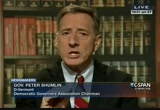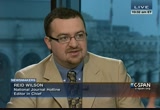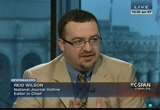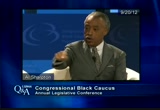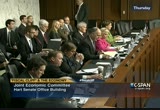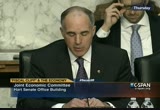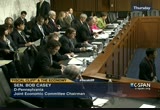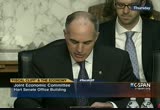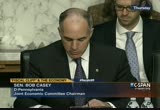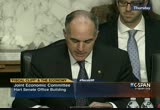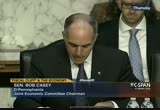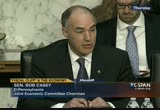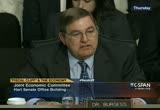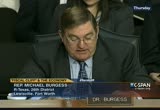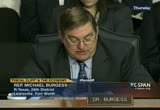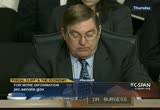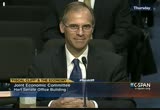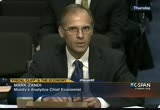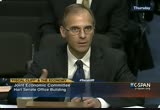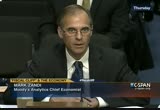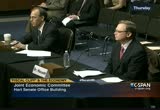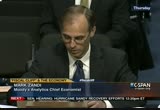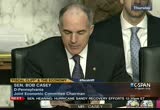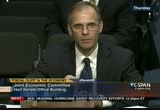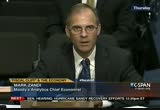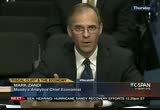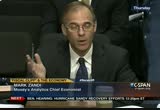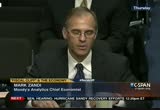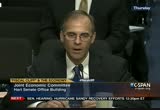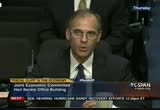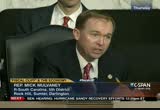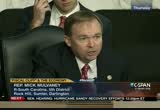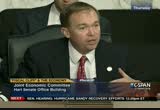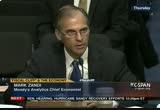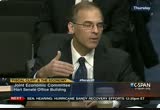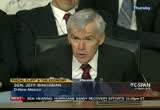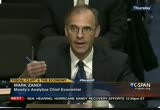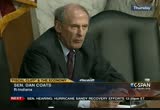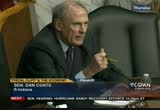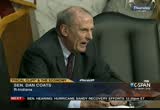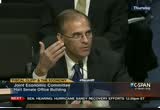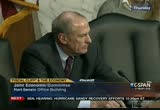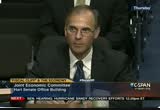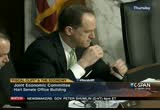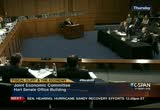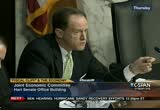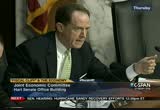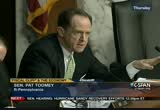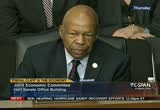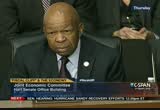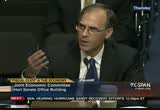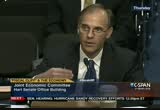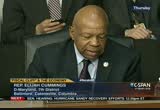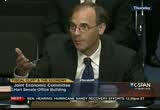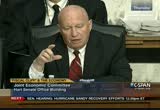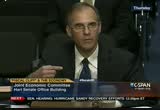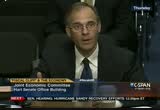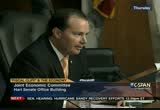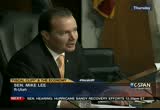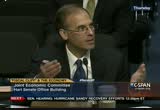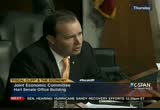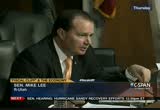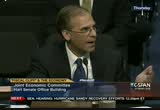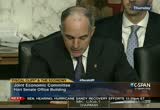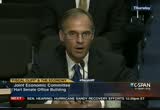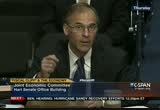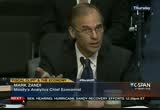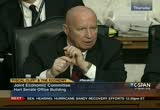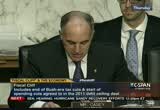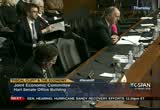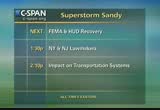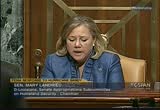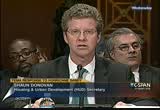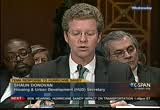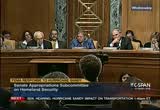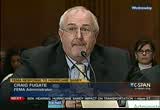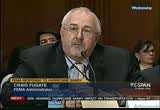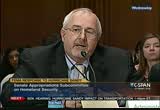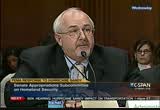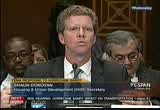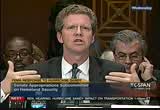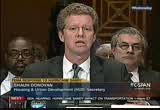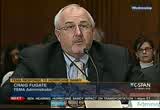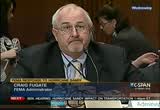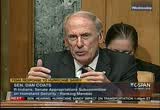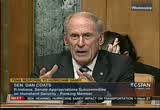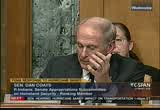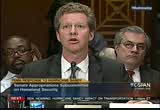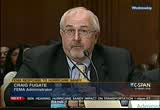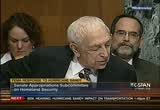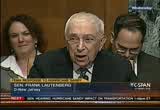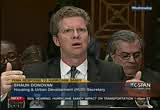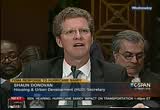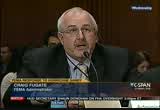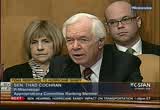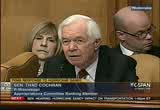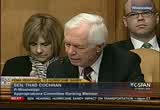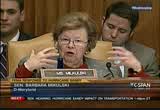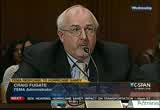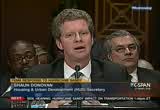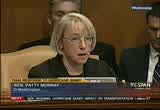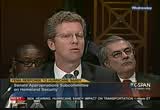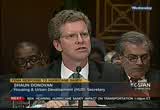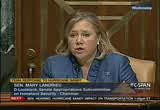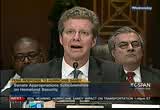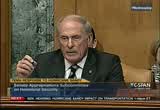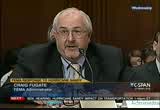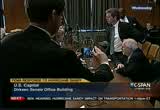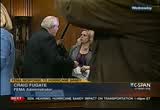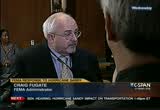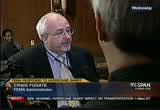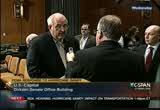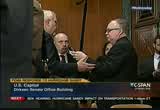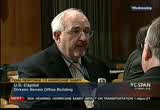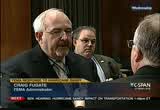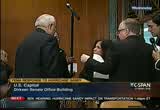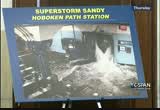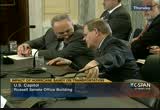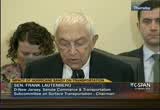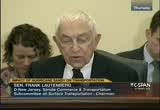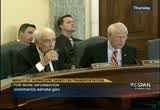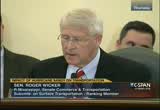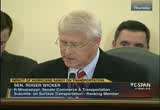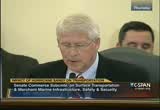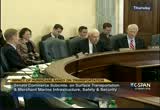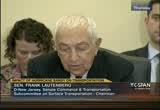tv Washington This Week CSPAN December 9, 2012 10:30am-2:00pm EST
10:30 am
that is what the president has said, within reason. two years ago in january he said i believe the state should be the laboratories for change for health care. what is right for vermont may not be right for oklahoma. but i will give you the flexibility you need as long as you are not reducing standards. as long as you are not saying " we're going to reduce the expectations and levels of care that we believe should be a basic standard that the affordable care act calls for." there is a different from saying we want the state to the laboratories for change and saying we want the states to be laboratories for change and we do not want to do a darn thing. these governors who are complaining about the affordable care act baffle me. in vermont, when we have both
10:31 am
businesses and the middle class struggling to pay for health insurance, what does this mean? when we implement the exchange, we are going to pick up $400 million in federal subsidies to help poor and middle-class families get reimbursements from the fact you're not getting before. that is a big win for the state of vermont. if we all make it work and then let the states be laboratories for change, once you do not go below those basic threshold, we all know we need health care. this bill allows us to have the resources we need to get more uninsured americans into the health-care system. it reduces costs and will make as a stronger nation. >> peter shumlin is joining us from vermont. thank you very much for being with us.
10:32 am
>> thanks so much for having me. >> why did he decide to take this job? >> it is a fascinating question. they're going to start this cycle $30 million a behind were the republican governors association is. they have opportunities across the upper midwest and states like florida and on the west coast. the governor of arizona is not so convinced she% limited. she think she can run. sheikh -- she is a term limited. she thinks she can run. even some states in the south and along the atlantic coast.
10:33 am
there are tons of opportunities for democrats. they are $30 million were the republicans governors association is. >> a lot of democratic senators are up for reelection. the pool of money will be pushed also for these governors races and more democratic than republican seat in the senate. >> there arare far more democrat of for reelection in 2014 and democrats are very nervous. they have the majority. next month we will see 65 democratic senators. they do not want to lose that majority. i think we will see a lot of money go there. democrats would like to regain the house majority. it still looks like it will be a climb.
10:34 am
>> there is not so much competition because the associations are not bound by the same finance rules. they can take corporate cash. they can take six-figure checks. there is a little easing of pressure. i think you will see some of these super pacs that have played a previous roles start to pay their attention to some of these key states. >> what did you learn today? >> that jerry brown will run for reelection. he is one of three governors who has ever served as both the young as governor of their state and the oldest. he is not going anywhere. if he is an office, maybe we will see a clinton/brown rematch. >> the democrats are not so
10:35 am
optimistic about new jersey. they are optimistic about virginia. sandy seemed to be pretty good thing for chris christie. >> the attorney general who typically in virginia waits his turn and then ms. of tulips and the governor has decided to run for governor. -- and then goes up for governor has decided to run. he is not happy about this. he is thinking about running as an independent. that would all but guaranteed the former democratic national committee chairman of the governor of virginia.
10:36 am
if you had some of the five years ago i would probably have called you nouts. >> wisconsin, scott walker is coming out of the successful recall. he has talked about as a very high presidential hopeful for 2016. president obama have a pretty sizable victory in wisconsin last month. i suspect the democrats will want to beat scott walker and get him out of the mix for 2016. >> to be continued. erin mcpike, reid wlison, thank you for being with us on "newsmakers" this sunday. [captioning performed by national captioning institute] [captions copyright national cable satellite corp. 2012] >> owhat peter shumlin again
10:37 am
today on all "newsmakers" at this o'clock p.m.. >> they will look at 623. -- 6-3. >> they decided on the indiana case it was constitutional for them to establish identification. they did not say that all of the state's -- >> let me finish. you are misrepresenting. >> when i hear these accusations that black people, voter i.d. disproportionate effects minorities, it implies to me that we are lesser than.
10:38 am
if white americans can get at vacation to vote in go through the process fees -- can go through the process to vote, black people cannot? we always have to make special, either there has to be a specialist when we deal with minorities because they are too feeble minded. we need to make concessions for them. they cannot follow the rules like everybody else. when you treat people like victims, i do not think they want to aspire. >> more with crystal wrigght tonight at 8:00. >> mark zandy and kevin haskett
10:39 am
testified before the joint economic committee. this is one hour and 40 minutes. >> the committee will come to order. we want to thank everyone for being here today. i did not have a chance to personally greet our witnesses, but i will have time to do that later. i want to thank both of our witnesses for being here. i will have an opening statement that i will make, and then i will turn it to dr. burgess. i know that vice chairman brady will be her as well. we know the challenges that we confront here in congress on a whole range of issues, which are sometimes broadly described under the umbrella of the terminology, fiscal cliff.
10:40 am
when we confront those difficult challenges, we have to ask ourselves a couple of basic questions. one of the basic questions we must ask is, what will be the result and will be the impact as it relates to middle income families? what will happen to them in the midst of all these tough issues we have to work out? we know there is broad agreement that going over the so-called fiscal cliff would jeopardize the economic recovery. it would do that by increasing taxes on families, halting employment growth, driving unemployment up instead of down, triggering a deep cuts to programs that families across the country count on. the job before the united states
10:41 am
congress is to reach an agreement that builds on the economic progress that we are making, and puts us on a path to fiscal stability. we need to cut more spending, and generate more revenue. we need to do it in a smart way that keeps our economy growing. earlier this year, congress extended the payroll tax cut through 2012. the two percentage point payroll tax cut has played an important role to sustain the recovery. boosting economic growth by an estimated 0.5% of one percentage point, and creating 400,000 jobs. we should continue the payroll tax cut through 2013, and yesterday i introduce legislation that would keep the employee payroll tax at 4.2% next year. to keep the economy growing -- there is good evidence of that in the last couple of months? job growth of about 511,000. to keep that momentum going, we should provide tax credits to
10:42 am
small businesses. my legislation includes such an incentive for small businesses to grow. i am confident that congress will again be successful in reaching a compromise in the days ahead. i look forward to hearing today from the experts that we have before us today on how to reduce the deficit while protecting middle income families. as we enter the holiday season, americans should not have to face the uncertainty that many will face with regard to their taxes. there is no reason that middle income families should go into this holiday season without
10:43 am
knowing whether their taxes will go up next year. last year, democrats and republicans work together to cut nearly $1 trillion of spending. now we need to continue that bi-partisan work to cut more spending, and to bring in additional revenues. if congress fails to reach an agreement under the budget control act of 2011, $1.2 trillion in automatic spending cuts will take place between 2013 and 2021. republicans and democrats agree that indiscriminate across-the- board cuts is not the right and to do at this time in our nation's history. if we trigger the automatic spending cuts and tax increases, gross margin bottom will fall by half a percentage point. we will reverse the hard-fought gains over the past few years. we cannot afford to go backwards. instead we need a balanced and bipartisan approach. one that balances the short and long-term needs, distinguishes between foreign investments and the core investments that must
10:44 am
be reserved, and spending that we can live without that utilizes both spending cuts and revenue increase. the first order of business should be to protect those middle income families i talked about and protecting them from a tax increase. the cbo estimates that simply extending the middle-class tax cuts would boost gdp by 1.3% and create 1.6 million jobs. let me say that again -- boosted gdp by 1.3% and create 1.6 million jobs from that tax cut we can enact. it would resolve much of economic safety for these middle-class families. the wealthiest among us can help us reduce the debt by paying more. it is encouraging to see republican members of the house and the senate speak out on the need or a deficit approach that includes raising taxes on wealthy individuals and to moving right away to ensure that 98% of families do not face a tax increase.
10:45 am
we need to look at history. what we saw in the 1990s and 2000s, there was no relationship between lower marginal tax rates for the wealthiest among us an economic growth. first during the clinton administration, the top marginal tax rate was raised on the wealthiest individuals and the economy grew at its fastest rate in a generation. it added more than 22 million jobs. during the following eight years, the top marginal rate
10:46 am
dax tax rate was lower, but economy never regained its strength from the reviews decade. middle-class families are vulnerable when the recession began at the end of 2007. i hope this hearing is helpful not just in this hearing, but across this country to people who are watching and waiting for congress to act. i will say more at the end about some of our members who are leaving. it has been an honor for me to serve as chairman of this committee and also served with my friend, kevin brady, as vice chair. he has been great to work with. i hope there'll be bipartisan success in congress. i look forward to working with him as i change seats in the
10:47 am
senate for the next congress. i am grateful to our witnesses, whom i will introduce. before i do that, opening statements. >> i think the chairman for the recognition. this is the concluding hearing from the 112th congress. i'm behalf of the vice chair, kevin brady, on behalf of republican members and myself, we wish to thank you or your services on the committee. this unique committee with equally divided. people are used to seeing such division producing gridlock in washington, but senator casey and senator brady worked together and had bipartisan cooperation. joint economic committee has riced as a widely respected forum on debating issues. i think you, senator casey, for
10:48 am
your leadership. i also want to recognize the retiring senator from this committee, the senator from new mexico and the senator from virginia. our first secretary of the treasury, alexander hamilton, observe energy is a leading character in good government. the president must lead in a divided government and must not advocate his or her responsibility. president obama has the responsibility to propose a real bipartisan plan to avert the fiscal cliff that can pass both the house and the senate. withdrawing from the recommendations of the simpson- bowles commission, the president could propose a plan that would not only avert the so-called fiscal cliff, but also help us avert the fiscal abyss.
10:49 am
if president obama were to offer such a plan, republicans would act favorably. going over the cliff is unnecessary. as it has been observed in "the wall street journal," the president is boxing in the republicans. he is offering them a deal they cannot accept. first, the president has repeatedly called for a balanced solution involving both revenue and less spending. what is obvious to the most casual observer is that this plan is not a balanced. the fiscal cliff involves nearly four dollars of anticipated revenue from higher taxes for every dollar of spending cuts, yet the president wants more revenue and fewer spending cuts. if we fell off the cliff, his
10:50 am
plan calls for another round of stimulus spending. you have got to be kidding me. what the president's plan lacks is any reform in our entitlement system. the unrestrained growth in entitlement system is driving deficits and driving the debt even higher than the percentage of our gdp. it is estimated to be as high as $128 trillion. even if they confiscate all of the income that excesses $1 million, we cannot pay for the entitlement commitments that the federal government has made. we have made promises to ourselves that we simply cannot keep.
10:51 am
without some sensible entitlement reform, our credit rating will be downgraded again. we will become a country that none of us recognize. secondly, fiscal plans failed to achieve their government budget deficit or debt reduction goals. dr. hassett has examined fiscal plans in other countries. on average, unsuccessful plans proposed an increase in revenue and spending cuts. moreover, the higher revenues in successful plans were generally drawn from non-tax sources and avid sales and adjusted fees for government services. thirdly, the government argues that the 2001 tax cuts are extended, raising tax rates on the top 2% will not harm the economy because it will not affect consumption expenditures. however, analysts have analyzed the combination of expectation of the 2001 tax reduction for the top 2% and the extension of the medicare act and capital income. under the president's preferred tax policy, the top rate would
10:52 am
go from 35% to 49.9% and for ordinary income from 15% to 25%. the long-term consequences of president obama's tax policies would have a profound and negative affect. capital stock would fall. fewer jobs and lower wages resulting in higher taxes would harm the middle class. data reveals three important facts of high income earners. the taxes on the wealthy raise as much faster than on everyone else during economic booms, but they also fall much faster
10:53 am
during economic bust. people report more income when tax rates are low and not when they are high. there are better ways to increase federal revenues than hiking tax rates. congress could enact a program of tax reform that would lower rates and eliminate interest reductions. the president could open up more federal lands and offshore areas for energy exploration. his administration could take a more balanced approach to new regulations. economic growth can help solve our fiscal problems if the economy had grown at the percentage as it has done in the past.
10:54 am
the treasury could have collected an additional 650 billion dollars in fiscal year 2012. the deficit that would have fallen. still bad, but remarkably better than where we find ourselves today. republicans stand ready to work with president obama for a balanced and bipartisan solution. so far, no evidence of that. let's create a long-term solution that does not burden individuals and gives businesses optimism to go forward and invest in the american economy. then the economy can grow for all citizens. i look forward to the testimony of our witnesses. >> thank you. i will introduce our two
10:55 am
witnesses. dr. zandi is the chief economist at moody's analytics. he looks at macro racquets and public policy. he is the influential source of policymakers and businesses and journalists. recently he published a report assessing the challenges of approaching the fiscal cliff and the most effective way to achieve long-term, fiscal stability. he received his phd from the university of pennsylvania. that will be a recurring theme in these introductions. [laughter] dr. zandi, thank you for being here. dr. hassett is the director and senior fellow at the american enterprise institute. he holds a phd from the
10:56 am
university of pennsylvania. his research includes the u.s. economy, tax policy, and the stock market. he is previously a senior economist at the board of governors at the federal reserve system. he went to that graduate school of business at columbia university. he has worked for both the george w. bush and clinton administrations. both of you went to the same university. i'm sure you can agree on everything today. dr. zandi first. >> thank you for the opportunity. it is an honor to be here with kevin, a good friend of mine. let me say that these are my own personal views. lawmakers have to resolve three issues -- first, the fiscal cliff. second, raising the treasury debt ceiling, which as you know is becoming an issue rarely soon.
10:57 am
third, achieving long-term fiscal sustainability. that is deficit reduction and tax increases and spending cuts that allow the gdp ratio to stabilize by the end of the decade. these three things need to be done now. in terms of the fiscal cliff, if policy is unchanged and we go over the cliff and there is still no change after that, the gdp in 2013 will 3.5 percentage points. subtract that and that is a severe recession. cbo and others are probably us
10:58 am
are underestimating how severe that will be because confidence is very weak. it is unclear how the reserve would response to this. we need to scale back from the cliff. at the very minimum, the cliff needs to be scaled back so it is only a hit to gdp at 1.5 percentage points at most. if you have more of a drive than that, it it becomes it. the economy will weaken. the budget deduction will deteriorate. we are seeing a fiscal drag in europe. i would argue that we should smooth into this drag even more. make policy changes so next year the gdp is half of this speed limit. that would be consistent with
10:59 am
extending an emergency program and some form of tax holiday. in terms of the debt ceiling, that needs to be increased. it would be nice to extend it at the next presidential election. it would be nicer to get rid of it altogether. it is anachronistic law that is a problem. it creates a great deal of uncertainty. as you can see, it can do a lot of damage to the economy. there are a lot of reasons why it is being considered to eliminate that ceiling. it should be carefully considered. at the very minimum, we should push this to the other side of the election. we do not want to address the debt ceiling on a regular basis. it is damaging confidence. on fiscal sustainability, we need deficit reduction in the next 10 years of about $3 trillion. to get there, a balanced approach would be $1.4 trillion in tax revenue. half of that would come through
11:00 am
tax reform and the other half through higher tax rates. $1.2 trillion in cuts to programs -- medicare and medicaid, social security, and other budget items -- that would leave you with approximately $400 billion in interest savings. at all of that together and you get $3 trillion. the spending cuts were implemented as part of the budget control act. if you add all of it up, if you go down the path i articulated, the spending cuts would be -- the revenue increases would be 2-1. i think it is very consistent in the spirit of simpson-bowles. it would be a good goal to achieve. it is doable from both an economic and a political
11:01 am
perspective. finally, you need to nail this down. finally, you need to nail this down. uncertainty is killing us. it is hurting business investments. it has not affected laying off decisions yet, but it will. if we do not nail this down, investors will bail and the economy will struggle. but if you address this problem reasonably -- we have made a lot of progress since the great recession. if we nail this down, we will be off and running. thank you. >> dr. zandi, thank you. dr. hassett. >> thank you. it is always a pleasure to appear before this committee.
11:02 am
under your leadership, this has always been a collegial lace to testify. it is an honor to be here. my testimony is broken up into two parts. in the first part i described the short-term consequences of going off the fiscal cliff. in that section, i concur with dr. zandi that if we were to go off the fiscal cliff with no policy changes, then the near- term negative economic consequences would be significant. it would throw us into a recession. in the second part of my testimony, i will discuss the trade-offs we face between putting off the tough problems for tomorrow because we are worried about near-term effects. i think the evidence of the long-term effects of government debt to gdp ratio is quite
11:03 am
overwhelming. it began with an early analysis who analyze economic growth that high debt levels. it has been confirmed that high levels of government debt shows low economic growth. these literatures can get more sophisticated. there is a paper that identifies a tipping point in gross debt to gdp ratio. if it gets above 73% and we are above that now, that has a very significant and negative affect on economic growth. to put the result in perspective, there is a simple tabulation that provides intuition for the result. if you run a deficit of 6% in
11:04 am
gdp for the next 10 years, that would add to the gdp ratio. that increase would be a not by the end of the decade that would reduce the forecast. these effects are very significant. that growth story might be alarming, but the picture looks worse if you think of financial calamity. much of europe this year has been in turmoil because of the greek crisis. look at the struggles and other countries and take consolation in our relative stability. a recent study examined long- term projections for other
11:05 am
countries debt burden. it found that the u.s. has a bigger adjustment than any of the european unions. it gives an urgency for us to act. it is also possible to theorize about how a continuation of these policies could hurt growth farther into the future. a recent paper shows that if we do not act on this, and we are basically producing a fundamentally different america. it suggests that we are going to move into a world by 2040 were economic growth in the u.s. is not what we normally expect to see each year. there is crowding out of unity by the government. that is how urgent it is. what should we do?
11:06 am
there is another large literature that looks at fiscal consolidations. using my own study as an example and along with my two colleagues, our metric of success is that they achieve deficit reduction. we found fiscal consolidations that were very heavily weighted for spending were much more likely to be except the both then consolidations that were heavily weighted toward tax increases. we speculate that this is because we find this result because the tax heavy fiscal consolidations do not make tough choices on entitlements and because spending is more real when you lift the tax rates. it is easy to discuss reforms that could but u.s. and a positive trajectory. dr. zandi and i agree on the
11:07 am
rough outline of what that would look like. the political challenge is a heavy one. if you look forward to the america we are creating, that we all have to agree that the stakes could not be higher. thank you, mr. chairman. >> thank you, dr. hassett. i would like to start with a comment about something we are probably not talking enough about. even as we are wrestling with trying to debt a handle on the fiscal cliff, we cannot lose sight of their urgent priority of making sure we have job growth -- job creation, to say the least. many of the components you have outlined -- that both of you have -- it comprised of the broad description of the fiscal cliff whether it is the expiring tax cut provisions, the expiring tax cut extensions, and
11:08 am
spending cuts as well. if you consider more, which of those would you consider having the biggest bang for the buck in terms of economic impact of those that we are discussing here today? >> it is a given that we will extend the current tax rates for taxpayers that make less than $250,000 on an annual basis. that is absolutely necessary. when you consider the other things that are happening -- in terms of the bang for the buck, the emergency unemployment insurance program is very effective. it is small in the grand scheme of things. cbo is estimating it would
11:09 am
costs per calendar year about $33 million. but the economic opportunity for job growth compared to the unemployment rate would be measurably more than that. we are down to go to million people in the program. it is falling each year. i expected to fall even more than that in the next year. there are also limits to how much emergency you can collect. there has been some good work that has come out of the reserve. it is a very significant
11:10 am
positive. i think the payroll tax holiday has been very affective. it has very high bang for your buck. it gets spent. it is designed in a way that helps lower income households. you might want to consider scaling that back. you can go to go 1%. remember making work pay? that was a good middle ground. it is probably more affect it in the sense that it is designed to help more middle and low income households. that is a very effective program.
11:11 am
>> dr. hassett, any comments on this question? >> thank you for asking that question. i disagree with my distinguished friend on this topic. keynes himself talked about the kind of place where we are right now. if you get onto a cycle of dependence on measures, it could lead to a downward spiral as the national get -- that gets bigger because you try to stimulate things with shots -- one-time shots. i speculate that you might incur that the best possible thing we can do right now for unemployed americans is fix our big problems. it would help if american businesses had clarity on what the future would look like. the sight of relief rally from
11:12 am
such a thing would be worth better than anything you could get. >> i appreciated. i'm out of time, but i will come back to these issues in a moment. >> dr. hassett, an interesting opposition since you cannot ask questions. let me pose a question to you -- if the best thing that can be done is a long-term fix for our problems -- get out of this cycle that we are in -- would you agree with dr. hassett on that? >> i agree that we do not want to get into a cycle of dependency. we need to phase out the support -- the temporary support we have been running through the economy. in fact, that is what we have been doing. go back to 2009.
11:13 am
by 2011, the fiscal policy was neutral in respect to the economy. this year it will subtract from growth 8/10 of 1%. we have gone from fiscal stimulus to fiscal drag. we need to smooth into the fiscal drag. the government will be -- debating how much of a headwind it will be. we need to smooth into that drag. in the long run, we will be better off for it. >> is that a committee rule? >> it's not a rule. we will just keep it to a minimum.
11:14 am
>> let me ask you for your response to his comment on the cycle of dependency. >> i think it is quite possible that is where we are. >> can i interject here? it feels that way to me. it feels like we are in a cycle of dependency. we are dealing with the 2011 debt limit and the stimulus from 2009. it is the same thing with different labels. i am having difficulty seeing a way out of this cycle, but i interested in your observations. >> the way that i think about this -- at moody's they have been careful to put in this perspective into their analysis.
11:15 am
think about the way of what happens when you change the way you are playing the game. if you decide to spend a lot this year or mail checks to folks this year, that has a multiplier effect. you might get 2% gdp growth this year. but if you take that away, you are starting out with gdp growth 2% lower. the problem is that the keynesian policy really needs to look at all three acts. so you go up and you go down. the effects are equal and opposite. there is a third phase where you need to pay for it. it is in the negative. in the end, you will have to pay something. you see that in the long run cbo analysis of these policies. we are in the hangover phase.
11:16 am
i can say that there is a way out and it is very promising. we need to recognize that we are out of the emergency period. if we can fix the problems, we can get out of the hangover. >> the president is proposing the 47% spending cuts and 57% spending increase. why in the world would be even consider the president posted plan under the scenario that you described? >> the argument against our paper being a guide is that there are many small countries that may be have to be more aggressive about spending because people who lend them the money might head for the exit quicker. if you want to base our
11:17 am
consolidation on the things that have succeeded in the past, we would be at a certain percentage of spending. there is great comfort that it would be successful. there is argument that we might be able to handle having bigger revenue share of that. if we copy the successful ones, we should surely almost succeed. if we have a half-and-half approach -- look at our paper when it came out almost two years ago. we said that the uk consolidation would fail. it had too much revenue. as we are seeing now, millionaires and billionaires are heading for the exit. that is what we are going to see. >> thank you. mr. chairman, i yield back. >> i would like to congratulate the chairman on his election and the fine work he has done as chairman of this committee and to congratulate mr. brady on being selected as his chair of
11:18 am
this committee and the next congress. for our distinguished witnesses, they agreed that what we need to do is have a long- term solution. i would like to ask dr. zandi how we achieve that. we are several million dollars apart from the president's proposal. how would you close that gap? outline the president's proposal and speaker boehner's proposal. how can we get people employed and move our economy forward? >> i apologize. there will be a fair amount of numbers here. revenueident's tax proposal amounts to about $1.6
11:19 am
trillion over a 10-year period. that is from higher tax rates. roughly 600 billion are from some kind of tax reform. they are all reasonably good proposals. speaker boehner's proposal on revenue -- is roughly $800 billion in tax reform. we are about $800 billion apart on taxes. my view is that we should roughly split the difference. i would suggest $1.4 trillion in tax revenue. $700 billion would come through tax reform.
11:20 am
we can discuss what that might look like. $700 billion would come from higher tax rates. the president would scale back one trillion dollars. we can talk about that. on the spending side -- does 600,000 -- speaker boehner has come forward with some proposals. i'm not quite clear on how much the spending cuts he has proposed. the president's proposal is short. to get to where we need to go,
11:21 am
that $3 trillion target and fiscal stability, we need $1.2 trillion in spending cuts. that should be part of the process. we should do some things to reform social security. after the end of the day, it needs to be almost double of what he is proposing. if you sit down and do the arithmetic of spending cuts and look at medicare and medicaid, unless you're proposing a big and structural change in the program, which i do not think is on the table at the moment, it is difficult to get that cut. it is really tough. if you do a run rate of about $600 billion in cuts, that is ok.
11:22 am
bottom line -- fiscal sustainability at the end of this 10-year horizon. if we do that, we are off and running here. >> my time is about to expire. dr. hassett, i would like to hear your analysis on how far apart we are and how we can close that gap. >> thank you. we have a tremendous opportunity to make sure that we hand off a thriving economy to our kids. i mentioned that it we were to run $600 billion deficit for the next 10 years, by the end of that, the debt -- it would lower our gdp forecasts. if we were to cut with the fiscal consolidations that $600 billion deficit to $300 billion, we would be buying future generations gdp growth in
11:23 am
the long run. it is ultimately a question of what kind of world we want to live in 10 years from now. if you want to look like the way europe has been growing, we will have a small consolidation, such as the small consolidation proposed by the president. if you want to have the kind of growth that i hope we can have with a bigger consolidation, that one is being proposed by speaker boehner. >> thank you. >> i would like to focus on something that is probably more of interest to the economists and ordinary people.
11:24 am
let's talk about ratios. what i heard you lay out, dr. zandi, was more of an ideal situation. they get you at roughly at $3 trillion. the negotiations over last year's debt ceiling -- the new number would really be 1-1. that is not actually my question. i want to get to now. we have looked at the president's offer. we haven't found any spending reductions at all. we found the $1.6 trillion tax increases.
11:25 am
we saw the extension of the unemployment insurance, which is an increase in spending. the delay in the spending cuts and no reform in entitlement whatsoever. do you think the president's current offer gives us the 2-1 test? >> no. he needs to come up with roughly $600 billion more in spending cuts over the next 10 years. i think that there are
11:26 am
significant reforms in medicare, medicaid, agricultural subsidies, and other programs in the budget. those are difficult things to implement. it takes a lot of guts to propose those things. i would not discount them. they are important. to answer your question more specifically, we do name or spending cuts to get to my ideal. >> policymakers need to reform entitlements. i do see members of the other party -- most notably, mr. hoyer --he said, not now. they are on the table for a later discussion. i have been disappointed that a lot of the discussion seems to be on the revenue side and not really on the cutting side. really quickly, the debt
11:27 am
ceiling. there is something about your testimony that caught my attention, which is your support for the initiative offered by senator rob portman. lawmakers can adopt a version of the so-called dollar rule to address the 2011 debt ceiling. policymakers could agree at the beginning to cover that here -- year's budget. they could -- adopting some form of this rule would be a good safeguard. i appreciate his comments. isn't this exactly what we did that now everyone is trying to get out of? we have a dollar of spending reductions.
11:28 am
1.2 is already in place. the other is in the sequester. isn't that what we did? if that isn't a good idea, why are you and the the others now suggesting it is not a good idea? >> let me say a few things. first, the broad context. we need to get rid of the debt ceiling law. it is agonistic. we need to get rid of it. i suggest that some version of the dollar for dollar rule should be incremented. at least considered. it does not need to be one-for- one. it could be 50%. that is not going forward.
11:29 am
my view is that we need to nail down how we can get to fiscal sustainability. get rid of the debt ceiling law. we need some form of budget rule to make sure that some discipline going toward. >> structure. >> yes, structure. we need to show people that we will stick to this plan. >> thank you. >> thank you very much for being here. i appreciate your testimony. dr. hassett, dr. zandi has indicated that he inks the debt limit crisis we had in august 2011 was bad for the economy and
11:30 am
the country and that we should avoid it for the future. do you agree with that? >> first, yes. i think the best testament of this has been done by co-authors who have a very cool index of economic uncertainty. it is a very innovative paper. they estimated that the debt limit struggle probably subtracted about 1.5% from gdp growth during that summer when it was happening egos of the uncertainty and inactivity that was caused by levels of uncertainty. each time we go through that, there are consequences. i would like to add if that is what it takes to get spending under control, we need to concede that in the long run there will be a benefit, which
11:31 am
means we do not have these deficits. in the fullness of time, whether a struggle last summer was worth it, if we have the spending cuts and deficits are lower, it might have higher economic growth in the long run because we went to that struggle last year. >> your position is that we should be ready to go through that struggle again and to call upon the national debt is necessary in order to enforce spending limits? >> that, of course, is not my position. we should never default on the national debt. the politics of debt reduction, which you on the better than me, are very difficult. i am not a political expert. if there is something we need to do that helps deficit reduction occur, i am not willing to stop process. >> you are saying defaulting of
11:32 am
the national debt might be something we need to do now and then? >> no, sir. we do not default last summer. >> we did not. but we might in january of february. is it your position that we should be willing to default on the debt if that is necessary in order to force spending cuts? >> i would not be willing to default on the debt under any circumstances. look at the history of what has been done. there is a long history of using that debt limit as a moment to distract from the party in power. if we had an academic seminar on the impact of the that struggle and the fiscal policy, he would say that it was a negative thing.
11:33 am
>> well, i have never until last year of august 2011, i have not seen any serious effort or serious threat made by the leadership of congress to refuse to give the secretary of treasury the ability to offer to meet obligations congress had adopted. i thought that was a new experience for us. it certainly was for me to see that happen. dr. zandi, you said you think that we need to repeal this law that tries to set a debt limit and concentrate more on taxing and spending policies that causes to raise the debt, as i understand? >> absolutely. it is a bad way to conduct policy.
11:34 am
it is a problem. look at july and august of 2011. it was a mess. gdp downgraded the debt. it really had an impact. cbo is estimating the interest costs is costing us money. it is pretty clear that this is not going to get any better going forward. it will be worse. this is a really bad way of doing things. we need to get rid of this. having said that, we need budget rules. we need to find a way to be credible. the debt ceiling approach is the wrong way of doing it. >> thank you, mr. chairman. >> thank you, senator. >> i want to pursue that question a little bit. this is on my mind also. my experience is the political
11:35 am
system find it awfully difficult to say no to constituents. with reelection in mind or a natural human tendency to want to please people rather than disappoint them. i had the privilege of meeting with christine lagarde from the imf. i asked about the reforms that were taking place in europe. i asked, would any of these reforms be taking place without europe being in a fiscal crisis mode? her answer was, absolutely not. unless the revolver is at the temple of the politicians with the finger on the trigger, they're not capable of summoning the collective will to
11:36 am
tell the people that represent that they need to take steps to resolve a problem and will cause disappointment and pain to do so. my experience in the years i have had in politics was exactly that. we never would have gotten what we did in 2011 without the threat of defaulting on our debt. to think that we could put a structure in place today that perhaps we would all be comfortable with in terms of solving our long-term problems and be assured that 10 years or not that congress would not have modified that dozens of times to the response of into joints who are banging on the door and saying this is to develop much pain, we could hardly sustain a
11:37 am
policy for months around here, let alone 10 years. if you want to fix the long-term situation, i think there is consensus that we cannot get from here to here to provide that kind of growth and what we want to hand off to future generations. we have to factor in a big factor of the political system here in the way politicians think and react. we need leverages in order to address that. i'm not really asking for a response. you have already answered to that. you have stated your position. i just wanted to add my two cents worth in terms of why i think it is important we have the leverage points. maybe there are other ways of
11:38 am
doing this, but my experience is that the next congress or the current congress can undo that in a big hurry as the constituents line up outside their doors. thank you, mr. chairman. >> can i -- in response? >> yes. >> in the case of putting the revolver against the -- in the case of europe, we do not want to do this on a regular basis. that'll be a problem for our economy. people will not be engaged unless they have clarity in this thing. i have more faith in this institution. after the end of the day, you do the right thing. if you look at the history of this body, it roughly comes up with the right answer.
11:39 am
we have not dealt with the debt ceiling since the beginning of this country. i think we are very capable and we can do it. >> i will respond by saying that we have been trying to deal with our cascading debt and deficit for decades. i would say that we have been far short of doing the right thing to look for a healthy fiscal future. >> thank you, senator. >> i agree that we usually do the right thing but only after we try everything else. the time has come. i see this as a scary time. we need to protect our fragile economy, but it is also an opportunity to move forward.
11:40 am
my first question is based on your predictions -- what do you think the timeframe is for possible further downgrades from the credit rating agencies? >> this is my interpretation. i do not know for sure, but this is a guess from my experience. i think people outside of the beltway have a lot more faith in you than you do. there will not be a negative reaction. by the way, i would counsel -- you will get a better deal.
11:41 am
>> in other words, a deal that does not mean much would not help us? >> in order to avoid a downgrade in the u.s. treasury debt, we need something lows to fiscal sustainability. we need to get to $3 trillion. if we fall short of that, that is a problem. >> ok. you brought up social security. don't we need more reforms to make that more solvent? if we were to embark on that and set up a commission, i think there is a lot of talk of ok, we should do that. >> i think that is a perfectly reasonable way to do it. >> my colleagues said that in the near term he would rather
11:42 am
see rates go up on the wealthiest americans because he believes it gives us a greater long-term chance to reform the tax code. do you agree with this assessment? also, do you think this is awise course? i support going back to the clinton levels. do you agree? >> i think we need to do both. if you are going down my path, we need both. there is no way to get to that number with tax reform alone. if you consider we will not take away a charitable deduction and if your goal is not to
11:43 am
raise taxes from lower and middle-income houses. there is no way to do the arithmetic. there is no good way of doing it to raise that kind of revenue. we need to do both. we need tax reform and we need higher tax rates on upper-income households. >> it seems to me you could do the tax rates at the end of the year because then you could make the kind of deal that you want. to some of the closing of the loopholes. you could bring the corporate tax rate down and work on the debt by closing the loopholes and subsidies. >> tax reform is complicated. nail down a framework and then go to work and try to figure this out. in terms of corporate tax reform, that is absolutely
11:44 am
necessary. the goal would be to make that revenue neutral. you want to bring down those corporate rates. >> what did you think of senator coburn's assessment? >> i have a great deal of respect for the senator, but this, i disagree. it would accomplished very little in terms of economic efficiency. with unemployment still high and -- we need to seek ways to make ourselves a friendly place. i am very concerned that i have seen the president continues to say that 97% of small businesses would not be affected. it is a very misleading statistic. anyone who has any profit from a sale on ebay would have -- we
11:45 am
would be calling them a small business. more than half of the income is in that bracket. i strongly disagree. >> they're willing to make some sacrifices as long as we really are on the right path. they see that as their own long- term liability. thank you to both of you. >> thank you to my colleagues from pennsylvania. i would like ask dr. hassett -- the president's proposal had some specifics.
11:46 am
i think it is clear there is a headline tax increase that he wants $1.60 trillion. what the administration would describe is $600 billion in spending reduction. it looks like 200 billion of what they put under the 600 billion is revenue. fees and various other forms of revenue. that is not spending restraint at all. there is a deferral of the sequestration. i am not clear how long that referral is meant to be. for one year, that is $100 billion. then there is additional stimulus spending and other things that add up to about $100 billion. that is $400 billion in the way.
11:47 am
you should legitimately deduct from the headlines 600 billion if he wanted to write what might be legitimate spending restraint. if you go back, $1.60 trillion of new revenue, maybe we have $200 billion in spending restraint, it is it fair to say that this is a 8 to 1 ratio? >> that is about right. >> eight times the spending restraint. >> that is right. there is some recidivism here in the sense that spending reductions have systematically been overstated in recent years by the president. it appears to me that there is a lot of tax increase and almost no spending reductions. >> spending programs that you
11:48 am
launch, that money gets spent. promises of future savings? much less so. when the president talks about new stimulus spending, i am not sure the savings would materialize at all. in reality, the president's proposal is almost entirely of new taxes and virtually nothing that is specific of the spending restraint. your research suggests that the most successful point of consolidation are those in which the ratio is almost the reciprocal of that. >> i can say with absolute certainty that a consolidation that has the shape of the president's proposal would fail. in the economy that we have now, in that kind of a world, it is impossible to envision
11:49 am
generating the kind of healthy economic growth that the government is willing to have the spending cuts we promise to do two years from now. we will be saying, we cannot afford to cut government spending because it will throw us into recession. >> that brings me to the next issue i would like to discuss. to get to the president's tax increase package that he is looking for, he is calling for higher marginal tax rates. in addition, a reduction in the value of deductions and other expenditures. higher taxes on capital gains, dividends. the way i count this up, if you include the limitations, the top marginal tax rates for some would be between 41 and 45%. that is just the federal level. we have states with varying income tax rates. some americans would be paying
11:50 am
more than half of their income. it would exceed 50%. if the president got all the tax increases that he wants, is likely that could precipitate a recession? >> it is not only likely, it would certainly do so. it is cataclysmic. if we go from a 15% dividend tax, to 45%, that is ridiculously bad news for an equity markets. it is something we saw on the other side. call for response to the dividend tax reductions and there was a lot of positive movement. as a package, there is a question of how negotiations work and maybe you want to start negotiations with an extreme position, i cannot imagine
11:51 am
anybody looking at proposal and not arguing that it would not throw us into recession. >> rather than taking an extreme that is very harmful, you look for areas where the other side to meet halfway. for instance, because of the political imperative that has been created, if revenue has to be part of this, shouldn't at least be generated in the way it does the least economic harm? in your view, would you do less economic damage by generating revenue through reducing the value of expenditures than raising marginal rates? >> if you phase it in far in advance, for example, changing social security benefits when i retire now, he would have a
11:52 am
positive growth the fed right now from the spending cuts because she would give clarity to all the people worried about the future of america. >> my time has expired. >> good morning. health care inflation is a significant driver of medicare escalating before us, what do you think should be done to control that inflation? i heard what you said about medicare. that is -- no matter what you do, you still have this inflation going on. it is major. >> let me say a few things. health care inflation in the last couple of years has slowed quite sharply.
11:53 am
it has been about 3.5%. it is very positive developments. some of that probably is due to the weak economy, which means less demand for services. some of its likely is do to the affordable care act. there is growing evidence of that. we do not know for sure. there are some positive experiences in the affordable care act that could reap benefits. the insurance exchanges, the independent payment advisory board. we will have to see how that works out.
11:54 am
most encouraged about the cadillac tax. this is a tax on gold-plated health insurance policies for folks like me. i get a very good health care package. if i get sick, i am unfettered in terms of my health-care consumption. it will make it more costly and i will start shopping for health care. that will create more transparency and get the growth in health-care costs down. we do not know what is going to work, but there are some interesting new programs that have potential. we should see how those worked out before we engage in some very significant structural changes. like a voucher program. we may have to go down that path, but it is much too premature to do that. we should see how these developments work. >> following up, "if
11:55 am
temporarily going over the cliff is necessary to achieving a good agreement, lawmakers should not hesitate to do so." how long do think we could stay over the cliff without doing significant damage to the economy? >> i think you could go into early february. by early february, it looks like you are not coming to a deal and investors began to discount the likelihood you're not coming to a deal, you will see stock prices decline, the bond market reacted. by mid-february, it would be doing a lot of damage. by the end of february, the debt ceiling, of really bad things will happen. you have about a month. a lot does depend on whether the treasury is permitted to freeze withholding schedules.
11:56 am
i'm going under the assumption that they can and will do that. >> a bad deal -- no deal is better than a bad deal. going back to, i am curious about, given your findings, do you believe the tax cuts for the first $250,000 in income should be extended immediately? is there any reason that it should be tied to tax cuts for the wealthiest in our nation? >> i think there should be done as a package. i think it will create brinkmanship. the nailing down the tax code, nailing down the spending cuts,
11:57 am
nailing down long-term sustainability, you have to do this all once. that is the only deal that works. >> you think that you can be done by the end of the year? >> no, i am skeptical. i think it can be done before significant damage. i am playing a political observer, but my guess is that we will have to go into next year. >> vice chairman brady. >> chairman, i apologize for being late. thank you for your leadership. you have been a terrific leader, a tremendous to work with. i appreciate your approach and how you handle yourself. thank you very much. i think there is a bit of
11:58 am
consensus in the sense that it is irresponsible to voluntarily go off the cliff, but equally irresponsible to come to a solution that does not address the key issues facing us. spending discipline, of fixing a broken tax code, and dealing with our biggest challenges. economic growth works. average recovery in this recession might have cut the deficit to $430 billion. returning to the pre-2008 levels. what is missing today, we know consumer spending is above what it was before the recession. government spending is above what it was before the recession. business investment, that area is what continues to lag.
11:59 am
in your view, do you think raising taxes on the two marginal rates as well as capital gains dividends, does that encourage more business investment in the economy? >> the threat of those increases is a very big negative. mr. brady, one of the things economists use when they teach graduate classes is something called the handbook of public economics. you had to study that, too, mark. i know i did. one of the later editions, there is a chapter on how taxes effect business spending. we go into a very gory detail about how negative this can be. if the dividend tax is going to go up, a lot of firms would be hurt significantly by that.
12:00 pm
if the dividend tax is going to go up, a lot of firms would be hurt significantly by that. they would be paring back their capital spending in anticipation of higher taxes in the future. businesses will look to the future when they decide what they're going to do. they are not investing. you see it's in the investment data. it is why this recovery has been so slow. businesses have a lot of cash and are not making a lot of investment. >> your point is this does not
12:01 pm
help the economy. >> you could go back to the writings, he was a scholar who identified very early on that business cycles, recessions, and recoveries tend to be driven by investment because consumers are pretty steady, but investments can be fluctuating. his view of the problem of stabilization policy was to try to stabilize investment and not to focus on consumption. one reason we have had such a disappointing recovery is that we have not address the fundamental reason why investment is so weak. we are a really unattractive place for investors to invest right now. >> why don't you just accept a higher tax rates? it would be politically very convenient. it does not solve the economy. it does not solve the deficit. it is not a serious deficit proposal. the credit rating agencies are
12:02 pm
looking for a plan that lowers the gdp to debt ratio. i do not think there is a magic number. social security, medicare, to find a sustainable path for word on them. do you think the president's plan adequately addresses the sustainability of medicare and social security? >> i think he needs to go further. i do not think it is enough. i believe the proposals are good ones. i think they are hard proposals to make because they're substantive. to achieve fiscal sustainability in the context of
12:03 pm
$3 trillion in 10-year deficit reduction, i think we need to do more. >> looking at the republican plan and the president's proposal, do you see any common ground? >> the common ground is that we're looking at the same proposals. cbo has scored a number of different approaches. i also think there is no general agreement in the context of the current discussion, we will not make any major structural changes to these programs. we will not block grant
12:04 pm
medicaid, and we will not voucher or premium support medicare. in this context, it becomes dollars and cents. this is not going to be easy. i would suggest that in this quest for more reform to medicare and medicaid, if we can say by the 10th year of the budget horizon that we are on the right path, i think that is ok. entitlement reform -- >> the number is whether we have solved the problem. >> entitlement reform is tough and you cannot do it in 10 years. this is a long-term problem. we should be thinking about this in a 20 or 30-year horizon. cbo scoring makes it incredibly difficult. we don't want it to force us to make -- >> i would like to take a step back and step in a slightly different direction from the fiscal cliff and talk more about long-term and medium-term economic realities we face.
12:05 pm
in your written testimony to this committee, you warned against kicking the can down the road indefinitely because of the adverse effect that might have on the economy. the medium and long-term impact it might have. i thought your analysis was definitely something we need to pay attention to. as you observed in the failure to make progress in this area now could signal that we have bigger troubles ahead. the moody's analytics model that you used breaks down about 2028. the reason it does that because at that point, the interest on our national debt will start to cripple our economy. we will be left without much recourse.
12:06 pm
i'm not sure there is a tax increase on the planet that could suddenly fix that. i'm not sure we could print money fast enough. if we did, we would go the way of argentina. i tend to think of this medium and long term risk as the fiscal avalanche. the cliff is something we are approaching now and we can see where it is. we know will hit the cliff. the avalanche is different. the only thing you know about avalanches, you know when the conditions are present. you know when the snowpack has built up to the point where it could happen. you do not know when it is going to happen, you just know it is coming. once it hits you, the avalanche
12:07 pm
becomes completely impossible to control. do you agree with this characterization about the avalanche? could you elaborate about that kind of threat? >> would you mind if i steal that from you? i will give you credit. i think it is right. i do think -- that is why what you're doing now is so important. this is a once in a generation opportunity for you to nail these things down. we're not that far apart. i really do not think we are. if you are able to put us on a credible path to fiscal sustainability, do it in a balanced way, i think we are golden. i think we will avoid that avalanche. if we do not do that, ultimately, it means we will
12:08 pm
never do it until we're forced by that avalanche. >> how soon will we need to do that in order to avoid the conditions? >> i do not know the answer to that. my model breaks down. it will happen long before that. >> it could happen within the next four or five or six years. >> here is the thing. the problem is, if we do not address this, we will be stuck in this slow growth netherworld of going forward. we will get nailed by something. i do not know what it is, but something bad is going to happen. that is going to be the thing that sets off an avalanche. >> a credit downgrade? >> something we are not even contemplating. we do not know what that will
12:09 pm
be, but it will happen. we will set ourselves up for that avalanche. that is why it is so important to get this right. >> what about a credit downgrade? if that were to happen, doesn't that call into question all kinds of things? money market funds and other types of investment funds are chartered to invest only in a certain grade of funds. if all the sudden u.s. treasuries were downgraded, wouldn't that have a pretty significant the fact on where we are relative to the avalanche? >> if there is downgraded treasury debt, this would likely trigger other downgrades. bank debt, they will get downgraded.
12:10 pm
jpmorgans of the world. money managers have in their relationship with their clients agreements not to invest in bonds that have rates below a certain grade. they will have to divest themselves because of the downgrades. this will cause problems in the credit markets. the credit markets will ultimately adjust. the reality has not changed. you will see hedge funds and private equity firms, but that is the process. it will take time. between now and then, it will create a greater amount of turmoil. it is what this means. it means that we do not have the political will to nail this thing down. and we will not. people will recognize that and we will go nowhere. >> if you want to preserve the
12:11 pm
entitlement, get us to balance. >> get us to sustainability. >> thank you, mr. chairman. >> i have one more question. i know we could be here a while if we had the time. i am grateful for the patience of witnesses. i was looking at the testimony and on page 8, he walks through the question of this balance of how you do the balance between cuts and revenue. in the second full paragraph, he says, using a range of different methodologies, the average unsuccessful fiscal consolidation relied upon a 53% tax increase, 47% spending cut spurred a successful consolidation consists of 85%
12:12 pm
spending cuts. i want to get your sense of that. whether you agree with that 85- 15. if not, why not? what would your approach be? >> i respect kevin's work a lot. i think that number varies considerably depending on the country and it depends on where the economy is in the business cycle. it also depends what the reserve is with respect to monetary policy. it is one thing if interest rates are 4 or 5%. it is another thing if we are at 0. there has been a lot of really good work revolving around these issues and trying to get good benchmarks for fiscal consolidation. a really great paper came out
12:13 pm
of the imf the last couple of days on this issue. it makes a very strong case that there was a fiscal speed limit. you cannot have too much fiscal consolidation too quickly. it becomes counterproductive. this balance between tax and spending in the context of the u.s., particularly when the economy is weak, the spending multipliers, when you cut spending, they are very large, much larger them was previously thought. i did not buy into kevin's 85- 15. in the context of where we are today, that is not right. having said that, i would do something like that proposed.
12:14 pm
two-one kind of ratio. if you do that, that is balanced and it did system reasonably good place. it gets us to fiscal stability and avoiding the avalanche. it is still more spending than tax, but it is more balanced. the last thing i would say, we're talking about taxes and spending, this is an important point. tax reform is spending cuts. there is no difference. if i give you a mortgage interest deduction or cut you a check. no difference. from an economic perspective, they are one in the same thing. that is a spending cut. >> i do not have anymore questions. >> looking at our global competitors who find themselves
12:15 pm
in financial crisis showed more than 20 times in nine different countries, those countries cut what they owed in their spending and grew the economy at the same time. they did that because their cuts were large, credible, politically difficult to reverse. there were real and they were believable. it created the confidence to grow an economy. it was proven over and over again. that is the model for this fiscal cliff discussion, making both the cuts and the reforms that are real and credible and politically difficult to reverse. that is the only signal we can send. it is the right signal to send to investors that we're serious
12:16 pm
about getting our financial house in order. chairman, thank you. this is your last committee meeting and you will be missed. >> going back to the analogy of the avalanche, when we had the subprime crisis, and there was no warning. likewise, we did have the same type of avalanche come tomorrow. there is no more confidence, nobody buys are debt. we would have increased interest rates and huge economic problem. we have two things in front of us. not only the fiscal slope, but also the debt ceiling. treasury estimates at the end -- we have until the end of february. in solving it, would be better to put the debt ceiling in the package with the fiscal slope for a comprehensive solution? or would it be better to do them separately?
12:17 pm
>> they should be done together. this will not work if we break this thing apart. we need to scale back the cliff. we need to raise or eliminate the debt ceiling. we need to achieve fiscal sustainability. this needs to be a package. >> i agree. >> i want to thank both of you for your testimony. >> thank you very much. i appreciate your good work and your leadership. thank you for your testimony. i think we made in 90-minute meeting. that is pretty close. that is pretty good. i want to thank both of our witnesses again for their testimony. by the way, without objection,
12:18 pm
the full text of your opening statements will be in the record of this hearing. we're grateful because it is clear to most americans we do have a substantial challenge with regard to the cliff. we know if we do not take the right steps, it could jeopardize our economic recovery. we cannot afford to lose ground on the gains we have made. i am confident we can get this done. the congress of the united states can successfully reached the compromise we need to assign a path to fiscal stability. this is my last hearing. vice chairman brady mentioned it. i have enjoyed this work as chairman and as a member of the committee the last six years. i am looking forward to more work on this committee as well.
12:19 pm
our work on job creation, deficit reduction, manufacturing issues and other issues has been informed by the perspective of many of our nation's top economists. two of them are with us today. and from other leaders in the business community and the non- profit sector. we're grateful for those insights as we seek to get answers. i also have a great working relationship with vice chairman brady. i am grateful for his work and the work of both parties on this committee. i would also like to recognize three retiring members. senator bingaman has served on the committee continuously from 1987 forward, 25 years of service. congressman from new york served from 1996-1998 and from 2005 until the present. they will all be retiring from congress at the end of the year.
12:20 pm
the record will remain open for five business days for any member of the committee who wishes to submit a statement or additional questions. if there is nothing further, we are adjourned. thank you. [captioning performed by national captioning institute] [captions copyright national cable satellite corp. 2012]
12:21 pm
>> explore the history and literary culture of albany this week and on c-span2 and c-span3. first, a fema and hud on the ongoing recovery from the storm. the centers from york and new jersey will speak out the storm impacted their states. -- the senators from new york and new jersey bespeak about how the storm impacted their states. this could be triggered in january of next year. our guest is robert levenson. then a roundtable discussion on house we castration -- house
12:22 pm
sequestration can affect the budget policy. "washington journal" live at 7:00 eastern here on c-span. >> we are at the new york state museum. this is our gallery dedicated to the history of 9/11 and the attacks on the world trade center. we decided to tell the story from the first moments of the attack using objects and photographs from the world trade center site. this piece of steel from the south tower we put in a place where folks can come and touch
12:23 pm
it. it gives visitors a tangible experience. this is a piece of steel from the north tower. this is a dramatically bent piece of steel. this is within 10 floors of the impact of a flight 11. you can see the opening for the windows would have been and this metal strip that would help the aluminum on the building appeared every still is marked with which building in floor. we research that after we took in this. bothis have the numbers. >> this week and come and join american history tv and c-span's local content vehicle as we look
12:24 pm
behind the scenes of the literary life of albany. >> next craig fugate and shaun donovan testifying on capitol here. this is about one hour. >> i think senator blooming paul has asked a very important question. i hope some of these can be answered today. if the skin to smash our constituents. i think we will be in good stead. that is most certainly what it has called upon us to do. i think this country is big
12:25 pm
enough and strong enough. we must be able to move forward. shall we start with their opening statement? >> i am sorry. did you prepare it in the reverse? ok. >> absolutely. thank you for the opportunity to testify today. i want to talk about the progress we have made in responding to a hurricane sandy as well as the challenges we face in supporting the long-term recovery. i know you followed the impact on the region. we have heard about that today from the first witnesses. e. heard about the tragic loss of life as well as the massive
12:26 pm
structural damage. as someone with deep roots, i had been affected by the storm. many friends are still dealing with the aftermath. i am honored to help with rebuilding efforts and pleased to be here today. having made several visits to the affected area after the storm has hit, i have had the opportunity to see firsthand and to speak with state and local officials and residents about their needs. it served as a constant reminder that while this is a disaster of epic proportions the suffering is on a personal level affecting families and communities. i would like to briefly discuss some of the recovery efforts to the storm. fema responded quickly and competently.
12:27 pm
i want to congratulate bill fugate for that. --bad senator fugate for that. finally, i will address the special role the president asked me to play with respect to redevelopment efforts. the significant work has evolved effective coordination between local authorities. this has included hu, fema, homeland's security, plus the army corps of engineers, state and local officials, and charitable organizations. hug has been doing a variety of work including mobilizing in a specially providers. we have made it a priority to provide temporary housing,
12:28 pm
identifying thousands of available units and getting that information to displaced citizens.o we issued a mandatory 90 day moratorium that includes all the counties in the disaster area appeared more than 300,000 homeowners -- disaster area. more than 300,000 homeowners in the area have a mortgage payments. this will eliminate the problem that occurred after the hurricane katrina and rita when some insurance company used it for other damages. we have been working to provide dam it assistance.
12:29 pm
after its flooded basements in multifamily properties owned by the housing authority, hud work to provide replacement broilers -- boilers and generators. we're making sure it they have the funds to make infrastructure repair by providing waivers so existing home funds can be used for disaster relief. the success of the effort grew in part out of what we lend and created in response to hurricanes katrina and read up. president obama charge, and security to work on how as a nation we addressed disaster related recovery. we created a long-term group composed of more than 20 federal agency and consulted closely with state and local
12:30 pm
governments. out of this published a draft of the framework which after public comment was published in its final version of the 2011. by allowing me to lead the effort, the president not only is applying the national disaster recovery are recognizes that to adequately address the normal range of regional issues it is necessary. we have developed strong relationships with these leaders and not only the housing but the broader redevelopment's issues as well. job no. 1 is our ongoing rescue response to help those affected by hurricane sandy including tens of thousands of families still in homes without power due to damage to their homes and many others that do not have
12:31 pm
homes at all. we will continue to work with fema and other agencies. as the president recognized, we must look ahead as well. we must not distracted the immediate responders from their jobs today. we want to make sure that homes are rebuilt and communities are made whole. we also want to build back stronger, smarter and more resilient silly. a 21st century -- resiliency. a 21st century response. this is a significant undertaking that will involve decisions large and small. to whether the gas station should be generator capable to whether how or where to rebuild
12:32 pm
and other areas. we can be forward leaning to identify obstacles before the impedance state and local efforts. this will not be a one size fits all project. that is why we will involve those who know the communities best, at the people who live and work in them. we want them to make their own smart choices when it comes to planning for disaster. joyce is that work for their needs over the long term. engage the we wiwe will public. these decisions should be made by local communities. that is how we built surely viper and sustainable communities. this cannot be accomplished overnight. it will include all the parties i mentioned. one critical piece is to get a significant appropriation from w weeks.
12:33 pm
efforts of the people and communities impacted, i am confident if we may get a priority we can and rebuild this region stronger and smarter. i know we can count on your help. i think the committee for the opportunity to test today. i would be happy to answer any of your questions. >> thank you. in my opinion the president cannot have appointed a better person to lead the long term effort. you are able and enthusiastic and capable. thank you very much. >> you took some action that has enabled us to respond.
12:34 pm
it insures that fema had the capability to respond. last year it was the decision of congress to fully fund disaster relief funds purses dealing with the ongoing disasters. they have a balance of over $4 billion. we are able to continue response to previous disasters. secretary donna van point out it is a finite resource and based upon the damages will require supplemental. much of the impact of sandy go far beyond fema programs. we have major transit issues. there will be significant challenges with housing. for the month -- fema's assistance for housing is
12:35 pm
limited. we can provide a renter's assistance for up to 18 months. if there are no homes to move into that continues as a burden. that is why we felt it was very important that we build the framework. we're very supportive of the president's decision to have a cabinet. it recognizes roles, much of the infrastructure and long-term housing needs are best addressed to existing programs that will need more funding. as we look at the supplemental, we're not just looking at the drf. we're looking at a whole range of federal programs that or restore them to sustainable economies.
12:36 pm
there has been no disaster recovery for a work unless congress had directed it. the legacy is still echo. another told we did not have was the team before these store beem hit. we have at management teams in states as far south as carolina and up the coast. the capability did not exist during katrina. the legacy builds that capability. oftentimes the areas because we are not certain where the
12:37 pm
damages were going to occur. the direction is to push resources as fast as we could in some cases resulting in that other programs returned. we are not quite 30 days in the storm. over $1 billion has already been authorized for temporary renter's assistance. we know there are survivors to and not received this. there are the challenges we deal with small populations that it does not mean in affects the capability. it does more to support the governor in bringing resources together to help match up the needs of citizens. and never look at people's homes
12:38 pm
being destroyed as whether it was presidentially cleared or not. my commitment is to continue to work with the governor as hard as i can. we will work with what the unmet needs are. i judge disasters by the needs of the state. >> that may be quick to think i share for their really extraordinary efforts to help last year as we fought for the funding necessary for coffee mug -- fema to be ready to respond. we did not know another catastrophic storm would hit. in the event that we have not done that, i guess all present recovery efforts would have to stop what little money was left.
12:39 pm
i want to think this committee for their strong advocacy. while it is not of great consolation who have lost their homes and businesses, at least it is something that the money is there so we could under take this break response language. let me ask you this. with that now being down to 4 billion, and the challenge you have described so eloquently, ocould you take a minute to describe the consequences of what would happen if congress does not provide a supplemental by going forward in the next few weeks? what would the impact of that the dax i think for the record
12:40 pm
we need to get your views on the record this morning. >> it is a critical question. he began to answer this question with a very important point. obviously female will need other resources. there are constraints on what fema can do. it'll stop them from rebuilding a homeowner that is waiting for a decision about whether they will have more than $31,000 to rebuild literally cannot get on with their lives but there is not a decision about whether the resources would be available. they had access to assistance
12:41 pm
from the small business administration. they are limited. what we often see is that because they have loan programs the smaller businesses because the neighborhoods are destroyed or deeply damaged, their prospects are shaky. supporting the loan is going to be impossible. we have thousands of small businesses that are stopped in their tracks. these are decisions that need to be made literally in the next few weeks i would also just at that this goes beyond those types of decisions. he could attest to how important the economy of the shore is in
12:42 pm
new jersey. whether or not we're able to move quickly enough to restore the small businesses for the summer season and is the decision if we do not have a supplemental it will be an entire other year for those businesses begin to recover. there is eloquent testimony this morning. many of you mentioned the importance of mitigation. that is something that will be an important part of what we will be focused on. as we plans, literally in the next few weeks and months decisions would be made if we rebuil backt smaller or smarter. knowing now what resources are available is critically
12:43 pm
important for not filling those plans for rebuilding. >> we work hand in hand after hurricanes katrina and rita to streamline public assistance. witnesses from both our states presented testimony at the house transportation yesterday calling for reform. he had some folks from mississippi and louisiana there. i am interested in how these reforms will be implemented. can you give us a few examples about how some of these reforms will aid in the recovery if we can provide these tools for you? you said something in your opening statement. could you elaborate? >> we are using flexibility that is inherent in ways that are not limiting ourselves.
12:44 pm
we would like to agree with jurisdictions in the state. with others there are like seven hospitals we will be looking at. it would make a lot more sense that we came up with a design phase. rather than doing that as a reimbursement project, issue a final estimate. the problem is this only refers to actual cost. what happens if you have coverages? starts to sound like we're doing the right of project we're going to need some estimates. what would happen to appeals?
12:45 pm
what happens to any funds that may remain after a project? with the applicant keep that? the savings in federal, reimbursements slows them down. it doesn't reduce concerns about what happens if the estimates were off. -- it does reduce concerns about what happens if the estimates were off. >> thank you. this is quite a morning. we have quite a challenge here. i do have some questions to director fugate.
12:46 pm
with your permission i will submit those questions and you can get answers back to us. i want to focus now on and not just the funding needed for the recovery portion of the response/recovery, but if there is a common theme throughout the testimony by the various senators it is that how do we get beyond the basics of recovery and restoration for the mitigation aspects? the challenge that we are looking there is relative to what would be the extraordinary cost. there is the density of
12:47 pm
constructions. we are talking about an enormous amount of money in order to do the mitigation that may be necessary to bring it into that 20 per century. we are not even talking about other types of disasters. we have a real fiscal challenge here. i would like to get your thinking of what was going on in your head as the various signatures are basically saying the smart thing to do is to use the lessons from other disasters in terms of the changes necessary to mitigate
12:48 pm
future costs. we have talked about restoration and sea walls and underground. just wiring the east coast underground given the density of the population is mind-boggling. how do we go from here? this goes to the challenges the secretary will have as you continue to work on the recovery. give us your general thoughts in terms of the enormity of this challenge. >> i would mention three things. you know the old can socratic both appeared our first job is to do no harm. hypocratic oath.
12:49 pm
our first job is to do no harm. one thing they have said religiously is if there are regulations that stand in the way of doing smart things, cut the red tape. cut the red tape. but the allowances of rebuilding the school exactly where it was in indiana, we did smart things in terms of rebuilding a port that was smarter than there was before. first and foremost, we have to find ways to not stand in the way of the smart decisions but to encourage them. with whatever money we have, that will allow the money to go farther and be smarter. a second, and you will see what we provide our supplemental request, you will see that we
12:50 pm
propose to invest in mitigation. we know from studies that for about every dollar that we invest in mitigation, we get $4 back in avoided costs over time. that is something we have to recognize as we go in. the federal government investing in these, and making a specific part of this proposal in each of the areas will be important. i would hope parted the reason the president asked me to do this, i've worked in the private sector in new york and new jersey. behooved there is a real potential here -- there is a real potential here. if we are avoiding future costs, avoiding private sector costs in the future, there
12:51 pm
should be a way to capitalize the benefits in the future into private sector funding today. one of my principals is that the government should be a leader in doing smart mitigation. we have to look to our partners at the state and local level and to the private sector to leverage. they will be the beneficiaries as well if we avoid this kind of damage. >> i the weekend showed that in new jersey, connecticut, and other areas where we use the flood insurance map programs and homes or elevated, many of them had a minimal damage and were able to be read occupied one power that came back.
12:52 pm
-- homes not elevated were often destroyed. city-wide mitigation may be more effective strategy. i would also caution about going underground. everything in manhattan was underground including hospitals and emergency room that were flooded by salt water and destroyed. where does it make sense to talk about this on a homeowner basis? where is this talk that we will have to look at mitigating a part of a community that piece by piece will not address the overall impacts. we are going to work with gail glass and state and with the science community. -- with the scientists and the state and with the science community.
12:53 pm
once you get into a dense urban area, the solution will not work. we have to focus on that type of infrastructure and the best way to mitigate future damage. >> thank you. >> thank you very much. in your area when katrina hit, you showed what persistence to make sure your area was treated fairly. even though i must tell you many of us were not a joyful to hear your requests but never the less the outcome was great. you have set an example. our country has to be prepared to protect its supporters whether it is from the military
12:54 pm
or other kinds of encouragement or as the establishment of a program that says if you build and live here, that your route should not be taken away from you without the government helping to restore things. one of the questions i thought about when i heard you had this assignment is how much you had to do with this. it may take a long time to solve the problem. we commend you for your work. administrator fugate, you and your people have established that when the core goes out the country is there to help their people. they're not only heroic.
12:55 pm
they are willing to take on whatever assignments come along. it made us all feel pretty good. secretary, the times report says the president will request between $55 billion and $45 billion. can you confirm a number here/ you did say we would have more information before the week is out. >> i'm not sure where those reports are coming from. we are still working on what our requests would be. we would continue to work with you and the governors and mayors to define those before they are submitted. we do expect to submit something this week to congress. >> when we discuss mitigation
12:56 pm
and we talked about sector rising -- sectorizing it, one thing i can tell you is that this picture, homes were destroyed all over the place. less than a couple of miles away we see what happened as a consequence of the beach replenishment. there is almost no damage there. it confirms what we have already seen in the past. none of the 50 states is exempt from a time when nature turns their back on them. it creates problems that cannot be handled with in normal state resources.
12:57 pm
we encourage you to understand that the number that is proposed within those limits is really important. the fact of the matter is that we have to examine the resources available, how much of the really -- but it can come from the insurance coverage. we anxiously await the opportunity to examine what the proposal is. i assure you we will pull a [inaudible]
12:58 pm
>> i could not agree more. everyone who has visited the shore in new jersey has seen the enormous differences between places that invested in these kinds of medication and those that did not. we can avoid far more costs later on. i would mention there are many places, almost everywhere we reinvest we need to think about mitigation, whether it is elevating individual homes. it is as we build transportation infrastructure. it is about the comprehensive approach in just about every program that we are taking on to think about mitigation. on the request, one in the things we're doing, in new york and other states put together
12:59 pm
numbers for what they thought the damages were. part of that is already covered by money fema already had at the time as well as some of the costs will be covered by insurance or others. i want to make sure there is an $80 billion number out there. this is one of the things we're doing right now. among those $80 billion in costs, which are ones that need to be taking care of but will be taking care of by private insurance? that is one thing that may have been missed in at least the way the press is looking at this. these are the damages. let's work with you to determine what needs to be covered by the federal government. >> we are still finding damages
1:00 pm
to katrina. we understand that we are asking for in a supplemental will actually be what we anticipate we will have to obligate. it will require looking at the disaster relief funds both to these and other disasters. beefy men dollar -- the fema dollar is based on what we will need this fiscal year. what you have >> i will enter recognize that the senator is recognized and then we will go to senator mikulski. >> i appreciate your willingness to call me before archimedean
1:01 pm
discuss these issues relating to debris removal and all the things that follow after the hurricane has hit. our experiences in mississippi, as you both know, have been serious and have complicated people's lives, destroyed homes, businesses, a changed landscape, diverting streams and rivers. the consequences of these hurricanes have been also meant a lot of the property involved is not just private property, which is huge especially with the recent hurricanes, but government facilities, training bases and facilities in my state of mississippi and on the gulf coast area. the marineg of craft led him in between louisiana and of mississippi. one anomaly of the things that
1:02 pm
have happened, louisiana got reimbursed for cleaning up a river, limbs and things like that in their state, but the application from mississippi included the same kind of activity, cleaning, getting branches and trees out of stream beds so that the training of our military forces could proceed there at their request. it has not been listed as an eligible reimbursement. the governor wondered if it was something he said that made somebody mad, like senator landrieu asked. and not saying it was wrong to reimburse louisiana and not
1:03 pm
mississippi, but it sure does make you wonder. take a look at that and see if it cannot be looked at in our fairness. these things sometimes do not end very quickly. we passed the disaster recovery act and we worked very hard on it. we wanted to try to implement some of the lessons learned from previous storms. i invite your attention and to the agreements that we have reached here in the congress on these issues and we look for your careful and thoughtful administration of the act and the funding level and have been provided. katrina was another thing
1:04 pm
entirely, but it still hangs over us and it is still with us. here we are with sandy. thank you very much for all that you are doing. we encourage you to use the fema funds provided as intended and as spelled out in the legislation. there's always the opportunity for supplementals. if you find there is something we have left out that need ashamed to don't be bring it before our attention. we appreciate you coming before us as we go forward trying to help the people recover from these terrible events. >> thank you for raising the issue of marine debris. that will be a huge issue for the northeast as it was on the gulf coast and those rules and regulations are all tied up in
1:05 pm
knots. let's use that opportunity to get that straight because there will be a lot of debris in the marshes, rivers, wetlands all along the east coast and it's not necessary for people to suffer the way that we did in trying to get to that debris because so many jurisdictions, etc. i want the staff to make a note of that to make sure we address that. senator mikulski. >> thank you, madam chair. >> if your not careful coming will have a mikulski and that is worse. trust me. you'd be happy to have one. >> am i not right, senator murray? >> that can be my next one.
1:06 pm
really, i want to they and you and the ranking member. this has been a great hearing. what you bring his experience in this area as the senator from louisiana and there is a great sense of compassion and also reform. we have a big job but if we could work together, we could institute reforms, responds in a very creative, compassionate way and keep an eye on the bottom line. i think that is what the people in the country and those affected would want us to do. right now, there is heartbreak in maryland. what i do want to comment on quickly are some of the things that are working. we do want to thank the president for quickly issuing the declaration of a general
1:07 pm
disaster -- a general disaster declaration. we thank secretary napolitano. i speak to her availability. fema, you have been on the job. we really want to thank you for that. the problem is the individual assistance. hud, i never thought it would get these high of marks and eastern shore, but you are. also in other parts of the state where there is compelling need where you have responded to the most vulnerable populations in those in the systems, so we think you. in maryland, first of all, we are a water state. we have the ocean. we have the bay. we have rivers. we have the susquehanna that can flood and also the potomac.
1:08 pm
i used to chair the findings of the mess so i am a reformer. -- i used to chair fema. readiness worked. it certainly worked in maryland. the governor o'malley, we were ready and we were brazilian. we also had our beach replenishment for ocean city that protected $2 billion worth of property because we spent public money to protect private property. that worked. now we are in the recovery phase and the response was great. we were hit by a hurricane come on the shore, of the bay come all the way to the inner harbor and the port of baltimore. then we were hit by this blizzard in the western part of
1:09 pm
our state, which is the appellation. we needed and national guard to respond. we had state troopers and other emergency responders on snowmobiles to get them out to warmth and safety. we did all of that, so now here we are. just a quick word about the sure. rich in tradition and pride, hard-working, commercial fishing and agriculture hit by a drought, diesel fuel and often by what we would consider unfair regulations. the unemployment rate in that area is among the highest in the state. it is at 9%. in some communities it is 30%. 62% of the children are on school lunch programs. you get the picture.
1:10 pm
we know the rest. my question to you, mr. fugate, and you, secretary donovan, it is not only how we can get rid of the box but think outside of the box to give people eligible for assistance and to get through this very hard time. also, as you have talked about, secretary donovan, to work in terms of a new opportunities for economic development in the restoration. could you comment? >> yes, senator. there is a joke in the staff. i groped in maryland when my dad was stationed there. >> they still talk about you. >> probably. >> i grew up or near rivers in
1:11 pm
maryland so i know exactly what you were talking about with the river community people making their money oystering sand crabing. just because you live near the water is not a sign that you're wealthy. i sometimes struggled when we have to say no because it's never easy but it does not mean we are not going to work with the governor to see what we can do. it needs to be based on what the needs are. if fema is not going to work, i do not think it means we have to walk away. this may elevate the express made, particularly the localized impact as well as damages that may not have been there in the initial survey but have become a problem as more examinations have been done and we will work with the governor on the but also work to support the citizens impacted by the storm. >> senator, i would just add to
1:12 pm
that, thinking outside the box is exactly right. we have one of the most flexible tools, as many of the senators on the panel, including senator murray, are appropriations chair, nos. community development block grants have been a very important tool in recovery. we have now had $30 billion used expressly to help communities recover from disasters through the community development block grant. already, we have worked with the state to move community development block grant money to places that have been affected. some of the very developments were thinking about all the eastern shore is a block grant money that has been able to come in. on that front, i would complement the senators for the work that they did after katrina and rita to learn from those
1:13 pm
lessons. is a very thoughtful reform proposal they put together for community development block grants and i think you'll see in the supplemental that we propose a number of changes that would help cdbg be an even more effective tool for the kinds of challenges that you are talking about. if they will ever forgive me for all of the late- night calls i have to make to the governor's mansion when i was working with governor barbour. some of the barriers we ran into coming decisions that were made, some of the adjusted not make any sense and where it was within my power, we changed them. we made it much more powerful in the responses. some of them, i could not change. your proposal, i compliment you for the thoughtful works going in that.
1:14 pm
>> i can tell you i know mrs. o'malley, judge john malley, she will not care if you keep calling. -- judge o'malley. she would say yes. first of all, you are a creative administrator. i will not prolong my generosity in having you participate here. it is my hope in my community affected that we would think it's not only a bridge during very hard times but also how we work from economic development. i invite you as you are assessing not what the governors are submitting that he would consider visiting us to look at what this is so we can not only respond we can also lay the groundwork for reform to be able to really help our
1:15 pm
communities that are so hard hit but are so terrific. >> and thank you, senator mikulski. senator murray. >> . thank you for the tremendous work on this critical issue. i am not from a state impacted by this hurricane, but as an american, we ought to come together. we need to learn from this and do some of things that are really important. as chairman of the subcommittee, i want to make sure that we use these house bills. i just want to make sure we are getting this right. thank you for mentioning debris. we do not have a hurricane, but there was one in japan that has hit the west coast and i understand the debris issue was well. none of us know what's going to impact us. i really appreciate your work on this issue. secretary donovan and mr.
1:16 pm
fugate, thank you for your words. i'm very impressed listening to the senators who have seen in tremendous thing happening to their citizens and we need to stand up and help them house will. we need to learn it from this and get it right. listening to your response on community block grant development, and now we have worked to make that more flexible. i think there have been some proposals of their about making it so, but i would like to go back and ask what issues you have seen in particular that says to you that is what we need to change? >> a number of the thing is have to do with simply the fact? it was envisioned as a block grant for regular course of business, housing, infrastructure, and other community needs. the types of things that we have
1:17 pm
run into, depending on the nature of the disaster, the incumbent targeting requirements have been an issue at times. there is a broad range of community that have been hit. if we are doing awards to a locality that was hit hard that just happens to be an a higher- income community, it may make it hard to revive assistance that they didn't, so that's an issue we are looking out. this is simply the process required in putting together the plans. what makes sense for public participation and other. during the normal course of business when there's not a disaster may not make sense at a time when you have the urgency of a disaster relief order to get the money flowing, as we
1:18 pm
talked about earlier. those are the types of that we have been looking up. >> the regular program, in regular order, do we need to look at how we would use it in a disaster and to provide flexibility? >> exactly right. i'm glad you clarified that. these are reforms needed everywhere. what the senators have worked on and what actually would be looked at when we're putting together the national disaster recovery free-market, let me put it this way. every single time we have had a disaster and we allocate money, we have done it in a customized weight. we thought maybe we would step back and think about a disaster block grant with specific provisions that could be taken off the shelf and use the time which is different from the way the regular grants were built
1:19 pm
because there are a lot of strengths there and that's what we have been looking at in putting together the supplemental. this is not to say there is something wrong in normal time. it's just that disasters are different and we may be need to customize those is a precarious. >> i would really like to work with you on that. if you could continue that conversation as we move forward. hurricane say and the impact of a lot of residents living in section 8 housing, hod-assisted housing and kenya tell us a little about the status of the house and? >> this is a critical piece of the immediate response work that we do. we have hundreds of thousands of eager public housing units were assisted housing units that we are working on. the first and most immediate
1:20 pm
issue was, as the storm was know, weng, havas you have housing for disabilities individuals and seniors. we needed to look at who needed to be evacuated in advance and and specifically focusing on those residences that had the most vulnerable people there and did have to do some number of the evacuation was there. the second area we were focusing on was restoring regenerators, temporary boilers, he, hot water, and electricity, because the fewer people we had the displaced from their homes, the more successful we would be in keeping those communities together and minimizing harm to these families and the cost of the government. we had 75,000 people in new york city public housing alone that lost power, heat, hot water.
1:21 pm
literally, i was talking to secretary panetta about using military planes to fly in boilers across the country to get them there faster to try to get them up and running. that has been replicated on a smaller scale in every community we have been working with to try to target. i spoke with mayor booker, mayors of hoboken's, atlantic city, others, about those immediate needs and i'm happy to say we are at a point where we have been able to restore power and electricity to every unit in the new york city housing authority and the others where we did not have to evacuate. that has been in major referred. there were some where we had ruptured oil tanks or others where we had to evacuate. the last thing we have done, and i really give great accolades to
1:22 pm
our partners in the local housing authority is that we went out to oliver housing authorities in 14 state regions and all of our private provider said, if you have vacancies, let us know because we can provide units to those were going to be displaced for some time. we know there and come qualified and we can move them directly and pare them with other house and to be able to move them into units that are available today. we identified thousands of vacant units across the region that we made available as a resource to move people in. >> have we reached out to all of our low-income families at this point? >> we still have questions about a very small number, in the hundreds at this point. they may have a boiler or a generator that's going. we are worried that when it gets down to zero degrees, it may not
1:23 pm
be adequate. we're working very closely with the market, for it gets really cold to try and get electrical wiring, boiler is all reinstalled and real operative so that we can avoid having to move those people. we are not done, but we are down to relatively small number of units given the original told we started with. >> i appreciate your work. >> we're going to bring this to an end in a moment. i have three questions i will ask you to answer them in writing. for the record, i want to make sure that welle senator murray is a year, i cannot underscore the significance for the need of flexibility in in this disaster recovery grant that the secretary has testified to. this idea emerged after katrina and rita. i had many local officials call in from the gulf coast asking if we had told them idea.
1:24 pm
yes, have told them about a flexible grant. that is what the local officials have asked for. it could be helpful to senator mikulski's need to get specific funding the counties that would not be allowed under current fema but could potentially be very helpful. it 618-36 months for the mitigation of funding to work its way down to disaster effective communities because of the process you are familiar with. could you please give suggestions as to how we could improve that within the next week to consider that to be authorized in legislation? would you support policy to advance a small portion of come a 10-15% of the most of the communities can get on with
1:25 pm
their work? two, administrator fugate, last year we've implemented legislation for temporary child care services. would you please tell us whether you are recommending that go forward or not? finally, the disaster loans. i am so tired of saying the loan. can i ask you what $5 million in loan-loss provision will do to help any community -- in alone operations will do? the operating budgets are hundreds of billions of dollars. who came up with a $5 billion cap? the realize all the money that a local government can borrow under this program is $5 million? no one has applied. i would not be there.
1:26 pm
it is of no use whatsoever. could we have some suggestions about what the cap should be coming out under what service decision communities be able to barrault come up to what percentage of their operating budget? $5 in and did not help the city of new orleans. -- $5 million last did not help the new orleans. what would buy dollars million help when 80% of our operating revenue disappears over night? that is still an issue out there for local government. again and, to conclude, the senator is correct. this response cannot just be about the federal government bailing everybody out. it has to be smart leveraging of the power of the local governments to leverage their own assets and in using the power of the private market to
1:27 pm
leverage the assets we need for smart rebuilding. those loans are important to leverage the assets of the local government. we can do a combination of grants, giving them power to leverage their borrowing capacity and new markets tax zones, which is not the subject here, but important for coming underfinanced. i did want to raise those issues. any final words? >> thank you for your testimony. we're obviously going back to do more. i have two final questions. the of get a sense of -- do you get a sense of when the long-
1:28 pm
term costs will be available? >> we will provide with our requests significant detail in how we have arrived out those costs and we would be happy to set up a follow-up meeting to go through those in detail at them and just to give you an example on housing. we are already 90% completed with inspections of those homes. it is similar transit and other things. there is lots and lots of work that has been done over the last month to get to how strong an estimate as is possible. that's not to say that every category is vital at this point. certainly, part of my job is going to be looking, as the administrator said, the smartest mitigation strategy varying from individual homes to more community-wide purges.
1:29 pm
we will provide you as a living in detail. >> that helps me segue into the next question for director fugate. i think we're in the seventh year and still handle long-term costs relative to katrina. if you have some sense of when we will need the end of those requests, it helps us all put this in context in terms of the relief fund and what we might need. >> that is what we base our annual appropriations requests on. as we get an end to more complex projects, as the chairwoman has pointed out, there are many project still to be resolved in a louisiana. since the administration has come in, we have been dealing with a lot of decisions made to get the final answers and get building going. we still have construction in
1:30 pm
mississippi. that mitigation saved us a lot of money because there were a lot of fire stations up and running. there are some examples. again come of this is annual appropriations based upon not the total damages but what we expect to be expended that fiscal year. on some of these projects, it takes multiple years once a hospital starts construction to get through, so it is based on what the annual expenditures are on these disasters. we would welcome any additional tools that could speed that process so the taxpayer knows what their total obligation is house early to get state and local governments the maximum flexibility instead of every year having to come back to get more money because we are doing this project by project. >> if i could follow up on about? you're absolutely right. no one is more anxious to close out the katrina-rita stormed and
1:31 pm
the people on the gulf coast. we have been dealing with this for seven years. thank you for raising about. if we provide some new tools for recovery and that we are facing today, if we could use some of those tools that we will provide for the east coast retroactively for katrina and redone -- rita, potentially we could save taxpayers money and save officials time. let's think about that. the senator raises a good point. at some point coming up to close out the past storms the focus on those before us. unfortunately, there's still some work that has to be done. we will keep this record open for one week. questions should be submitted by close of business wednesday, december 12th. thank you for your expert testimony. >> thank you for your leadership. [captioning performed by national captioning institute]
1:33 pm
>> if you cannot rent, it's much better because that's money back in the economy and it's a way to keep the income there. we did not want to wait until people realize that this may be a resolution they did not want them. remove them in places that were available. these will be run by the state- run programs. if you can get there were property in your community, go right in. that also means was, as the
1:34 pm
house are repaired, they're able to move back. these tools have been made available, but at this point, we are 30 days into the disaster. as we work with the housing task force, the tools are available if they choose to use them. >> so as far as the populations? >> this is case by case. what we're finding is why we do need these units? because people's homes are damaged or cannot be repaired. this is a different program for us. we would bring in temporary housing normally. the weekend of the electric mcardle, heat, get you back in your homes, it is temporary work. we work with the states to make it a much more effective program verses brain in temporary housing units central
1:35 pm
to locate that. is available to the state-led task forces. these are resources available. the state to make determinations on what their needs are. in some cases, they may determine it would be useful. in some cases, they say they would rather rent to keep money in the economy. or can we do some expedient repairs were is as bringing in temporary units? >> so if the new jersey and new york say they need them? >> there are already there ready to go. we have already moved some in the area. based upon what everyone has seen it, we made the decision to move in a limited number. there are several hundred in different places and we brought them in because we know if it's needed, we wanted to be able to
1:36 pm
rapidly move. in new york, one problem we think will be successful -- one program we think will be successful is the windows expedia repairs. but we can do enough to get them back in their homes, it will be a lot more beneficial. >> mr. fugate, when you and the president went to atlantic city the runner of the marine now got a hug from the president and president introduced her to you. they said they do not help businesses. she got a lower rate for a loan from community bank and she thought she was used as a font of -- a photo op. >> the tool we use is the small business administration and these loan programs. that's what we have available. >> with legislation and waiting to change that? secretary donovan says they want to make businesses whole.
1:37 pm
>> la businesses are the biggest challenge. the tool that is is readily available are the small business disaster loans. for those without insurance, and as always meet the needs. one of the biggest losses we see in a disaster is a small business. oftentimes they have very high failure rates. part of what we're looking at it and knowing about it will not address all of these issues. how'd we put money back into the local economy quicker? where can you bring in additional resources to help small businesses as they deal with not only damages but what happens to the customers to move away? what happens in those areas driven by tourism and other activities of they are not back up to where they can start writing revenue again and? >> will that be in the bill? >> it's being looked at again. one reason why secretary donovan
1:38 pm
is taking a lead role here is because some of these. as will go beyond direct damages they would at sea. because of the widespread nature, this could be a tremendous impact. >> looking at additional programs? >> this will be run by the government. what additional tools can we bring to the governor's to provide additional resources and what can we do to support small businesses? >> at the very end, use of the budget request for what we think is boy to be needed, as we look at the numbers coming members of the requests, is a possible that some of what will make the number lower is they will not be able to rebuild? >> that's exactly what i was saying. particularly in the fema programs, it is a unique funding source. those bonds do not expire. we get a preparations annually
1:39 pm
in for the disasters that we have had a and we make sure we have bonds available to respond to the next disaster. it is not just about spending this much raw in this disaster this year, but it is also keeping the standards. when congress fully funded that, it was also to provide the faunas out for something like this. but you have to be ready to go. our annual appropriation does not only the total figure for a disaster. it is what we expect it to the extent and looking at based on opportunities between this money floods, tornadoes, etc., and additional funds to be ready to go. >> new jersey says it is only $18 billion and you only put in $12 billion? >> that is why i explain it
1:40 pm
because if it is eligible, it's eligible. funding requests are based upon what we expect to expand in the calendar fiscal year. new jersey is interesting because you run a calendar year for local budget. a lot of towns do. this is the challenge because they spend a lot under responses. normally we would wait until the bills come in and it would submit them for debris and response costs. we recognize that you have to show plus and minus on december 31st. go ahead and give us your estimates and we cannot put out an estimated work sheet knowing you probably still have more work coming in. we have a pretty good idea of what the response costs are so far. we get that estimated data get them out so they have their current fiscal year. >> in the legislation and, will
1:41 pm
it change the cost share for public assistance? >> in our request, the current program as are about 75% federal share, 25% stake in a local. there is a provision when they reach the threshold of $134 per costs, we would recommend to increase cost sharing to the president increasing to 90% federal. >> you are not moving into 100%? >> we base this on what will work under our programs, working with the governors and congress on how they structure the supplemental. >> are a going to ask for more money for flood insurance? >> we will be looking at increasing authority based upon a number of claims that are
1:42 pm
1:43 pm
rep 0 google, microsoft, facebook, atwitter hosted by the pew center starting at 9:00 a.m. eastern on c-span3. >> the supreme court will look what was passed in 2008 by a majority 6-3, i believe, and they will say that it is precedent. and indiana had a free voter i.d. >> let's talk about the facts. they decided on the indiana case that it was constitutional for them to establish identification. they did not say that all those things were subsequent. >> correct, they talked about indiana. let me finish. umass represented what i said. >> no i did not. >> hold on. >> the supreme court is the law of the land. when i hear these accusations that voter i.d. laws disproportionately affect minorities, it implies to me
1:44 pm
that we have something missing in our brand. to me, if a white american can get an id to vote and go to the process to follow the law, what are you telling black people? somehow they are not good enough? they are greater than? that's what bothers me about a lot of the rhetoric coming from democrats and laughed. we always have to make special concessions when we do with minorities because they are to be will minded. we need to make concessions for them -- they are too feeble minded. we treat people like a victim was, then i do not think they want to aspire. >> more with the editor and publisher of conservative blackchick.com tonight at 8. >> testimony from senators from
1:45 pm
new york and new jersey about how their state transportation systems were affected by super- storm sandy. but they appear before the senate commerce subcommittee unser's transportation. this is about half an hour. >> good morning. i welcome everyone to today's hearing which have called to address the devastating impact that super-storm sandy had on our regional transportation, the most widely new transportation network and unprecedented damage to our system and estimates of the
1:46 pm
damage have reached more than an $7 billion. across the regent, a train tunnels, stations, railyards all flooded with critical equipment ruined and some of that equipment, unfortunately, was barely know -- fairly new. these pieces of equipment have been rendered almost useless. we seem an almost incomprehensible of damage in this picture. a boat dragged across the new jersey transit tracks. roads and bridges were damaged, left littered with debris.
1:47 pm
the holland tunnel, a major commuter route facility, carries thousands of vehicles every day in new york city-owned it was flooded. the damage to our infrastructure did not just cause structural problems but it shut down a region. for many commuters, getting to work became a much longer, hardy was, and expensive experience. you can see why, from this picture at the hoboken path station. it's hard to believe the water was 6 feet high. this is a classical station. we will talk about that. what do we do?
1:48 pm
do we just repair things? limited transit and access to york, some in new jersey suburb multi-hour commute two and three times the usual costs. there were reports of endless traffic. in case you were not aware, heavy traffic before this is just magnified by the problem we already had. demonstrate transportation system had severe economic impact. the prime example, the largest port on the east coast that supports more than 550,000 jobs in the region. because of the extensive flooding, dangerous debris, damage to electrical systems, the port was largely shut down,
1:49 pm
nearly driving commerce to a halt. this has a nationwide impact on millions of people throughout the country to ride on our rails and they also felt the effects of zande while they work to get the system was running again. they cannot do it all on their own. something of this magnitude requires a response with the full power of the federal government. it will take all of us working together to make sure that our infrastructure is more resilient and better prepared for the future. one project that will help us
1:50 pm
get there is a new tunnel, the amtrak gateway project, allowing this to add much-needed capacity for millions of americans who use new jersey transit and amtrak trains. this tunnel will also be better protected against flooding and provide an alternative route for when disaster strikes. it would help prevent damage like we see here to the hudson river tunnel that covers new jersey transit. you can see there are tracks visible through the water and it is a shocking sight because you do not know what kind of damage it carries so we must do this in a hurry. we also remember the storm is a sign of things to come. in this changing climate, the intensity of storms have
1:51 pm
increased making extreme weather like sandy more and more common. as we devote resources to recovering from this storm, we have to invest so that we are better prepared for the future. if we make these smarter investment on the front end, we can save a lot of money and heartache in the future. each of the witnesses here, including my colleagues at the table, from the region and our regional transportation agencies have all played a central role in response. we have all been working together in lockstep because what happens in my state, our state of new jersey effects were york in a major way. that is also true if the flow is it in reverse.
1:52 pm
i it think you all for testifying to get our region up and running again. -- i thank you all for testifying. i look forward to hearing your testimony about how we can do the best job possible. i am pleased to be here with my colleague and ranking member, senator wicker. >> thank you, senator lott and bird. i want to thank you for holding this hearing -- sen. lautenberg. we'll get to our colleagues in just a moment, but let me say, as someone from mississippi who has experienced damage from devastating storms, i want to particularly assure you and those in this room that you have my condolences and my empathy because of the damage
1:53 pm
and loss of life that hurricane sandy brought your region. i understand the impact a major storm can have on the lives of americans. seven years dr. hurricane katrina made landfall along the gulf coast taking the lives of over 1800 people -- seven years after hurricane katrina made landfall, many in mississippi are still trying to rebuild. i have witnessed firsthand the devastation of hurricane katrina and i understand it could take years to recover fully. i hope recovery in new york and new jersey will lot takeouts long as it has for hurricane katrina, but i would not be surprised if, regrettably, the recovery does take a long time. the hearing today will look at
1:54 pm
the effects of sandy and the transportation network of the new york/new jersey region. transportation and infrastructure is a crucial. these are needs for both people and freight. when the transportation network of a major city is crippled, the effect can be felt throughout the united states. i look forward to hearing from witnesses and what they're doing to repair the damage caused by hurricane sandy. i would take a moment to mention the assistance that mississippi received during and after katrina and makes us all the more eager to help our fellow americans in the northeast recover from sandy. for many in mississippi, helping those affected by sandy is especially meaningful mission. our own recovery following katrina involved countless contributions of volunteers, church groups, non-profit organizations and emergency teams from across the nation including the northeast and we
1:55 pm
appreciate that. today, mississippi is reacting in kind by taking an active role to assist the northeastern communities. the gulf states bar department has provided a pumper truck to the west hamilton beach volunteer fire department in new york. more than 100 staff and volunteers from the red cross mississippi region has done work at shelters and distributed supplies in pennsylvania, new jersey, and new york. dozens with the task force volunteered to serve meals and help remove debris and fallen trees. i commend all of these volunteers as i commended the volunteers from other sections of the country that helped us in mississippi. for the voluble work they have done in this crisis, we could not have made it and recovery from sandy could not be complete without the work of
1:56 pm
charitable organizations and volunteers. thank you and i look forward to hearing from our colleagues and the other witnesses. >> thank you, senator. if you have a short statement? >> of course. >> doesn't get any shorter? >> it's getting very short. of course. >> is he getting >> florida is the place to be. it's so short just to say that hurricanes are a way of life. it's a part of our lifestyle. therefore, we are much more prepared. it thank goodness we have the head of fema we have now that used to be the head of the emergency management services in florida. he went through all those four hurricanes that hit us in 2004.
1:57 pm
he is a real professional. craig fugate. what you all are suffering is that hurricanes are not supposed to come to the northeast and especially not in october, and especially not at high tide with a full moon. you put all that together in your starting to experience some of the things in a category one hurricane that we experience in category four and five hurricanes. i feel your pain and i want to help. [no audio]
1:58 pm
>> anyway, we are pleased to have our distinguished colleagues chuck schumer from new york, bob mendez from new jersey and i believe senator gillibrand will be here shortly. the senators have been a strong partners in this rebuilding effort. it is a great privilege to work together. we are really strong team we share the value of a quick action and sufficient resources to get this job done. as i mentioned, we are in the largest transportation. in the country and it takes diligence and skill of our
1:59 pm
friends and colleagues. senator schumer. >> thank you, mr. chairman. first, thank you for this hearing but also for your great partnership. new york and new jersey were together as a bipartisan by- date delegation along with our colleagues from rest of the northeast to deal with this awful, awful devastation. it is good you are in so many important positions that will have a lot of say in how we deal with this and we're grateful forthank you, ranking , senator wicker. west hamilton beach was in my old congressional district. it is one of the few volunteer fire departments in new york city. it is right on the water, the great jamaica bay. the generosity of mississippi to west hamilton beach has been noted and much preceded by s. bay. and the generosity of mississippians to west hamilton
176 Views
IN COLLECTIONS
CSPAN Television Archive
Television Archive  Television Archive News Search Service
Television Archive News Search Service 
Uploaded by TV Archive on

 Live Music Archive
Live Music Archive Librivox Free Audio
Librivox Free Audio Metropolitan Museum
Metropolitan Museum Cleveland Museum of Art
Cleveland Museum of Art Internet Arcade
Internet Arcade Console Living Room
Console Living Room Books to Borrow
Books to Borrow Open Library
Open Library TV News
TV News Understanding 9/11
Understanding 9/11
